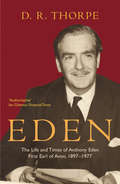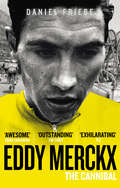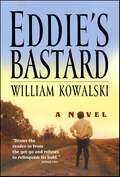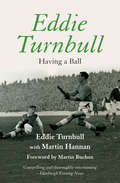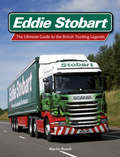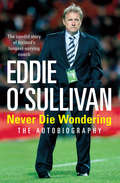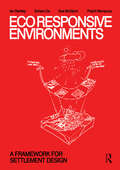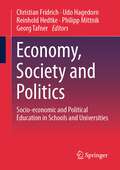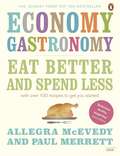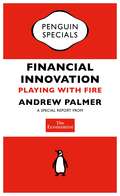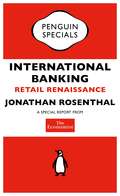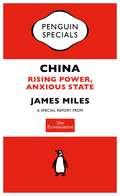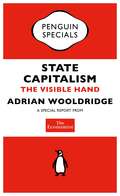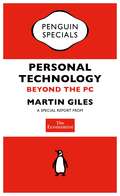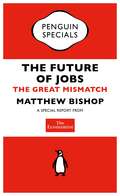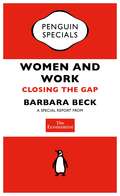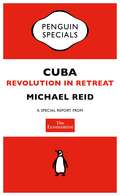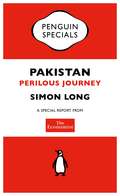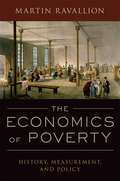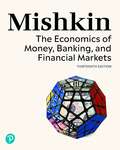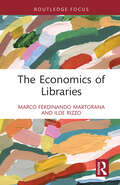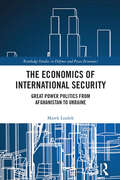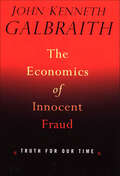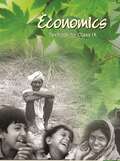- Table View
- List View
Eden: The Life and Times of Anthony Eden First Earl of Avon, 1897-1977
by D R ThorpeAnthony Eden, who served as both Foreign Secretary and Prime Minister, was one of the central political figures of the twentieth century. He had good looks, charm, a Military Cross from the Great War, an Oxford first and a secure parliamentary constituency from his mid-twenties. He was Foreign Secretary at the age of 38, and the first British statesman to meet Hitler, Mussolini and Stalin. Eden's dramatic resignation from Neville Chamberlain's Cabinet in 1938, outlined here in the fullest detail yet, made an international impact.This ground-breaking book examines his controversial life and tells the inside story of the Munich crisis (1938), the Geneva Conference (1954), Eden's battles with Churchill over the modernisation of the post-war Conservative Party and his rivalry with Butler and Macmillan in the early 1950s, culminating in a fascinating analysis of the Suez crisis.
Eddy Merckx: The Cannibal
by Daniel Friebe'The whole point of a race is to find a winner... I chose to race, so I chose to win.' For 14 years between 1965 and 1978, cyclist Edouard Louis Joseph Merckx simply devoured his rivals, their hopes and their careers. His legacy resides as much in the careers he ruined as the 445 victories - including five Tour de France wins and all the monument races - he amassed in his own right. So dominant had Merckx become by 1973 that he was ordered to stay away from the Tour for the good of the event.Stage 17 of the 1969 Tour de France perfectly illustrates his untouchable brilliance. Already wearing the yellow jersey on the col du Tourmalet, the Tour's most famous peak, Merckx powered clear and rode the last 140 kilometres to the finish-line in jaw-dropping solitude, eight minutes ahead of his nearest competitor.Merckx's era has been called cycling's Golden Age.It was full of memorable characters who, at any other time, would all have gone on to become legends. Yet Merckx's phenomenal career overshadowed them all. How did he achieve such incredible success? And how did his rivals really feel about him? Merckx failed drug tests three times in his career - were they really stitch ups as he claimed? And what of the crash at a track meet in Blois, France that killed Merckx's pacer Fernand Wambst, which Merckx claimed deeply affected him psychologically and physically? Or the attack by a spectator in 1975?Despite his unique achievements, we know little about the Cannibal beyond his victories. This will be the first comprehensive biography of Merckx in English, and will finally expose the truth behind this legendary man.
Eddie's Bastard: A Novel
by William Kowalski"Eddie's Bastard" is William Amos Mann IV, known as Billy -- the son of a heroic pilot killed in Vietnam and an unknown woman. The last in a line of proud, individualistic Irish-American men, Billy is discovered in a basket at the door of the dilapidated mansion where his bitter, hard-drinking grandfather, Thomas Mann, has exiled himself. Astonished and moved by the arrival of his unexpected progeny, Thomas sets out to raise the boy himself -- on a diet of love, fried baloney, and the fascinating lore of their shared heritage. Listening to his sets out to capture the stories on paper. He is a Mann, Grandpa reminds him daily, and thus destined for greatness. Through the tales of his ancestors, his own experiences, and the unforgettable characters who enhance and enliven his adolescence, Billy learns of bravery and cowardice, of life and death, of the heart's capacity for love and for unremitting hatred, eventually grasping the meaning of family and history and their power to shape destiny. Steeped in imagery and threaded with lyricism, Eddie's Bastard is a novel of discovery, of a young man's emergence into the world, and the endless possibilities it offers.
Eddie Turnbull: Having a Ball
by Eddie Turnbull Martin HannanAs the first British player to score a goal in European club competition in 1955, Hibs hero Eddie Turnbull holds a unique place in footballing history. In Eddie Turnbull: Having a Ball, he charts his extraordinary career and tells the story of his eventful life so far.Turnbull explains how he became one-fifth of the most celebrated forward line ever to grace Scottish football - the Famous Five of Hibernian FC - and reveals how he had to wait until he was eighty-two to be awarded his first international 'cap', despite having played for Scotland nine times throughout the forties and fifties.After his playing career ended, Turnbull achieved lasting fame as manager of Aberdeen and his beloved Hibs. 'Turnbull's Tornadoes' beat Jock Stein's Celtic side to lift the Scottish League in season 1972-73 and won the Drybrough Cup twice, in 1972 and 1973. During his decade with Hibs, Turnbull also managed George Best, and here he tells all about his turbulent time with the late great legend.In this engrossing memoir, Turnbull candidly explains why he walked away from football in 1980, recounts many entertaining behind-the-scenes stories and gives his diagnoses of the ills of the modern game.
Eddie Stobart: The Ultimate Guide to the British Trucking Legends
by Martin RoachFrom humble beginnings in a Cumbrian farmyard over forty years ago, the Eddie Stobart fleet has found a big parking place in the nation's heart, loved as much for its 2,200 immaculate green and red trucks, each emblazoned with a girl's name on the front, as for its famous army of dedicated Stobart Spotters who try to find each one.Buckle up with the Stobart drivers, and join them on a week in the life of a massive delivery, from paperwork to pallet. Learn what it's like to be sat in the driver seat of a Stobart truck - the noises, visibility, clutch control, gears, steering - and discover the sheer size and power of these machines.Illustrated throughout with amazing photographs, and featuring first-hand stories of incredible journeys from the intrepid truckers, as well as astonishing facts and stats and the history of the fleet, this is truly an irresistible book for Stobart fans of all ages.
Eddie O'Sullivan: The Autobiography
by Eddie O'SullivanHear the story of the rise of one of Irish rugby's great outsiders and, ultimately, his crushing fall.As the longest-serving national coach in Irish rugby history, Eddie O'Sullivan produced a team that rose to third in the world rankings and laid down the standards for the team to fulfil its Grand Slam potential. Added to the three Triple Crowns he won in his six-year reign and the Corkman ought to enjoy legendary status in his homeland.Yet, few figures in Irish sport divide opinion quite like O'Sullivan. Ireland's abject performance at the '07 World Cup in France prompted extraordinary levels of criticism and precipitated O'Sullivan's fall.Here O'Sullivan talks candidly of the spectacular unravelling of confidence within probably the best Irish team in history; of the bizarre rumour mill that followed the Irish team through that World Cup; and takes us behind the scenes of a story that tossed an entire nation into mourning.From his relationships with his successor as Irish coach, Declan Kidney, and indeed his predecessor, Warren Gatland, to his early struggle for recognition in the Irish game when the absence of a traditional rugby background militated against him, O'Sullivan pulls no punches in this revelatory story about far more than rugby.
EcoResponsive Environments: A Framework for Settlement Design
by Ian Bentley Soham De Sue McGlynn Prachi RampuriaEcoResponsive Environments integrates our current knowledge of designing for human needs, with a deeper understanding of natural systems. The book offers both a call to action and a comprehensive yet pragmatic framework for practising the art and science of settlement design, called EcoResponsive Design.Bridging the gap between theory and generic policy on the one hand, and design for specific places and sites on the other, the book is aimed not only at the professionals involved in planning, designing and developing these places, but also the wider range of communities interested in creating better spaces for our everyday lives.EcoResponsive Design encompasses all scales, ranging from the overall form of settlements and the landscapes in which they sit, to buildings and the detailed design of public spaces. Drawing from projects, places and best practices in many different countries and contexts across the world, it demonstrates how positive changes at the local scale can be achieved for every single site, large or small. The book urges a shift in focus from individual specialisms to collaborative actions, enabling development stakeholders to negotiate a balance between short-term financial viability and longer-term environmental and social values.
Economy, Society and Politics: Socio-economic and Political Education in Schools and Universities
by Christian Fridrich Udo Hagedorn Reinhold Hedtke Philipp Mittnik Georg TafnerThe interconnections of economy, society and politics so obviously determine socio-economic and political structures and problem situations, current ways of thinking and acting as well as the collective perception of solution options that their still low attention in university teaching and school education is surprising. Phenomena such as pandemics, climate change, migration or authoritarianism make the close, complex and contradictory connections between economy, society and politics tangible. Against this background, socioeconomic research, teaching and education are urgently needed. The theme volume aims to contribute to this by presenting research contributions on problem complexes such as economy and democracy, perspectivity and multiperspectivity, situation, interest and politics, subject and subjectification, and discipline and curriculum.
Economy Gastronomy: Eat well for less
by Allegra McEvedy Paul MerrettLearn how to eat better and spend less with deliciously easy recipes 'Delicious, thrifty, inspiring' GUARDIAN Featuring over 100 mouth-watering recipes and practical tips, Economy Gastronomy will help you to cook simple, better food, and along the way save you a lot of money_______With this essential cookery companion, you will learn how to . . . - Get two, or even three, meals out of one basic ingredient - Turn leftovers into new and exciting dishes - Stock your cupboards so there's always a meal in the house - Shop seasonally, freeze and store food - Plan your meals and shrink your food bills With breakfasts, lunch, dinner, snack and treat ideas, you'll be making luxurious meals without spending a fortune or discarding surplus food in no time. Recipes include: - Caramelised onion and Cheshire cheese tart - Onion bhajis, tarka dahl and almond rice - Spinach, ham and ricotta gnocchi - Chinese-style crispy duck Filled with money-saving hacks and no-nonsense recipes, Economy Gastronomy will teach you how to use and spend less, without scrimping on flavour.
The Economist: Playing with Fire (Penguin Specials)
by The Economist Publications (PUK Rights)The Penguin Economist Special reports delve into the most pressing economic issues of the day: from national and global economies, to the impact of trade, industry and jobs. Written to be read on a long commute or in your lunch hour - be better informed in under an hour.Is financial innovation good or bad?Did it cause the financial crisis of 2007/2008?Are the current financial systems working for a stable global economy?Andrew Palmer answers these questions in his special report, but urges that it's more that just a debate on whether financial innovation does or doesn't work. In fact, he claims, it is almost impossible to draw these distinctions.Using a variety of examples - from social bonds to securitisations risks - he highlights the weaknesses in innovative strategies, revealing how some innovation is doomed to failure.The consequences of innovation are now so crucial and so scrutinised - it is essential reading for anyone in the business world.Sections include:Playing with fireThe ferment of financeThe little guyFrom vanilla to rocky roadThe fast and furiousOf plumbing and promisesOn the side of the angelsSafety first
The Economist: Retail Renaissance (Penguin Specials)
by The Economist Publications (PUK Rights)The Penguin Economist Special reports delve into the most pressing economic issues of the day: from national and global economies, to the impact of trade, industry and jobs. Written to be read on a long commute or in your lunch hour - be better informed in under an hour.Retail banking is heading for a revival. With the financial crisis still hanging over Western economies, banks have rejuvenated the retail arm of the business. They are now seen as more stable sources of profit than the risky traders.Technology is both a help and a hindrance. On one hand, online banking is revolutionizing money management. But will this lead to the close of the high street bank? How can banks outstrip the developing tech companies who are offering rival services?This report will assess the challenges and opportunities that banks face in the rich world and the emerging markets. Sections include:Retail renaissanceWithering awayDispatches from the hothouseCrunching the numbersA wealth of walletsOver the sea and far awayPrivate pursuitsWorld, here we come
The Economist: Rising Power, Anxious State (Penguin Specials)
by The Economist Publications (PUK Rights)The Penguin Economist Special reports delve into the most pressing economic issues of the day: from national and global economies, to the impact of trade, industry and jobs. Written to be read on a long commute or in your lunch hour - be better informed in under an hour.'The line up for next year's change of leadership does not give cause for optimism' says James Miles, the Economist's China correspondent.With a heavily state owned banking system, waning numbers of workers in a labour intensive industrial economy and lack of development in new business, China's current boom may be set to bust. In the following sections, James Miles examines the restrictive nature of government in China, and what it will mean for the country and the rest of the world.Urbanisation: Where do you live?Rising power, anxious stateChina's new leaders: The princelings are comingGrowth prospects: Beware the middle-income trapDeng & CoGovernment's role in industry: The long arm of the stateDemography: Getting onIdeological battles: Universalists v exceptionalists
The Economist: The Visible Hand (Penguin Specials)
by The Economist Publications (PUK Rights)The Penguin Economist Special reports delve into the most pressing economic issues of the day: from national and global economies, to the impact of trade, industry and jobs. Written to be read on a long commute or in your lunch hour - be better informed in under an hour.As Western liberalist capitalism flounders in the wake of global recession, state backed companies are slowly taking over.The melding of the power of the state and the power of capitalism is on the rise. Prevalent in the emerging economies of China, Russia and Brazil, some of the world's most powerful companies are state owned. The 13 biggest oil firms are government controlled. China Mobile has over 600million customers and the Emirates airlines is growing at 20% a year.However, despite the numerous successes, Adrian Wooldridge urges caution. He asks whether it could easily survive if confronted with difficulty, criticises the embedded corruption and cronyism and asks whether a fair trading system is possible to maintain with government favoured business.Slowly but surely, the invisible hand of the market is being usurped by the visible, often authoritarian, hand of state capitalism.Sections include:The visible handSomething old, something new - a brief history of state capitalismNew masters of the universe - how state enterprise is spreadingTheme and variations - state capitalism is not all the sameMixed bag - infrastructure and innovationThe world in their hands - state capitalism looks outward and inwardAnd the winner is - fatal flaws
The Economist: Beyond the PC (Penguin Specials)
by The Economist Publications (PUK Rights)The Penguin Economist Special reports delve into the most pressing economic issues of the day: from national and global economies, to the impact of trade, industry and jobs. Written to be read on a long commute or in your lunch hour - be better informed in under an hour.Twenty years ago one gigabyte of memory cost $200,000. Now, a terabyte (1000 gigabytes) costs a mere $100.Technology permeates our everyday lives and never more so than with our portable, personal devices. Businesses are struggling to keep up with their employees' technological abilities and demands.In Personal Technology, Martin Giles unpicks the changing landscape of technology, examining apps, new devices and their effect on world trade. In the following sections, he explains how technology and the economy are becoming inextricably linked and how this has resulted in the birth of the new, digital age.Beyond the PCConsumerisation: The power of manyApps on tapPersonal technology at work: IT's Arab springAdapting personal IT for business: The consumer-industrial complexDroid warsUbiquitous computing: Up closeTechnology and society: Here comes anyware
The Economist: All the World's a Game (Penguin Specials)
by The Economist Publications (PUK Rights)The Penguin Economist Special reports delve into the most pressing economic issues of the day: from national and global economies, to the impact of trade, industry and jobs. Written to be read on a long commute or in your lunch hour - be better informed in under an hour.In the US, the average age of a gamer is 37 and 42% are female. Last year the industry earned $56billion worldwide. Tim Cross analyses the proliferation of the video games in this Economist special report, and how its successes are set to grow. Sections in the report include:All the world's a gameAs you like itThe business of gaming: Thinking out of the boxPaying for pixels E-sports: Gentlemen, start your computersViolence and addiction: No killer appAlternative uses: The play's the thingThe importance of fun: Homo ludens
The Economist: The Great Mismatch (Penguin Specials)
by The Economist Publications (PUK Rights)The Penguin Economist Special reports delve into the most pressing economic issues of the day: from national and global economies, to the impact of trade, industry and jobs. Written to be read on a long commute or in your lunch hour - be better informed in under an hour.Globalisation and technology are changing the structure of the labour market. Now, companies have the choice to recruit from further afield and without the need for traditional office workers. Matthew Bishop explores how companies can, and will, recruit employees in the future and how individuals can get ahead in this era of change.Sections include:The great mismatchLabour-market trends: Winners and losersBottom of the pyramidSelf-help: My big fat careerFree-for-allCompanies' concerns: Got talent?The role of government: Lending a handA better balance: More feast, less famine
The Economist: Closing the Gap (Penguin Specials)
by The Economist Publications (PUK Rights)The Penguin Economist Special reports delve into the most pressing economic issues of the day: from national and global economies, to the impact of trade, industry and jobs. Written to be read on a long commute or in your lunch hour - be better informed in under an hour.When students graduate from university they are employed in equal numbers. Move up the ladder a few rungs and the number of women in high powered positions has fallen dramatically.Women make up just 3% of Fortune 500 CEOs and still generally get paid less than their male counterparts.Barbara Becks ask why this is and what can be done about it. She covers:Closing the gapFemale labour markets: The cashier and the carpenterA world of bluestockingsWork and family: Baby bluesTop jobs: Too many suitsWomen in China: The sky's the limitLooking ahead: Here's to the next half-century
The Economist: Revolution in Retreat (Penguin Specials)
by The Economist Publications (PUK Rights)The Penguin Economist Special reports delve into the most pressing economic issues of the day: from national and global economies, to the impact of trade, industry and jobs. Written to be read on a long commute or in your lunch hour - be better informed in under an hour.Raúl Castro is changing Cuba. Recognising the limits that the Soviet style economy places upon the Cuban people, he is allowing the market greater freedoms. A new, private sector is emerging and is expected to employ around 25% of the labour force by 2015.What will these changes mean for foreign business and for Cuba's position on the global stage?As there doesn't seem to be a Castro successor and the party is pressured by the younger generation and the digital world, where will Cuba be in ten years time?This report will reflect on the likelihood and impact of political and economic change on the island - essential reading for anyone involved in the region.Sections include:Revolution in retreatThe deal's off - growing inequalitiesHasta la vista, baby - a disappearing populationEdging towards capitalism - slow reformGrandmother's footsteps - political changeThe Miami mirror - Cuba and MiamiThe biological factor - what next for the Castro dynasty?
The Economist: Perilous Journey (Penguin Specials)
by The Economist Publications (PUK Rights)The Penguin Economist Special reports delve into the most pressing economic issues of the day: from national and global economies, to the impact of trade, industry and jobs. Written to be read on a long commute or in your lunch hour - be better informed in under an hour.Pakistan is in a tricky situation. It is under constant scrutiny by the world media but is more often than not described in terms of its problems.There are indeed difficulties - bordering the unsettled nations of Afghanistan and Iran puts it in a precarious position. A poor and badly educated population for the most part is not helping the country's growth.There is hope.The wealth of natural resources, a growing, urban population and a more democratic government all point to a positive future.But with the NATO withdrawal from its troubled neighbours nearing, Pakistan's survival hangs in the balance.Simon Long's special report includes the following sections:Perilous JourneyToo close for comfortState of vulnerabilityCaptain's inningsIn the shadow of the mosqueLights offA taste of HunnyAlways with usDripping with bloodGoing with the flow
The Economics Of Poverty: History, Measurement, And Policy
by Martin RavallionThere are fewer people living in extreme poverty in the world today than 30 years ago. While that is an achievement, continuing progress for poor people is far from assured. Inequalities in access to key resources threaten to stall growth and poverty reduction in many places. The world's poorest have made only a small absolute gain over those 30 years. Progress has been slow against relative poverty as judged by the standards of the country and time one lives in, and a great many people in the world's emerging middle class remain vulnerable to falling back into poverty. The Economics of Poverty reviews critically past and present debates on poverty, spanning both rich and poor countries. The book provides an accessible new synthesis of current economic thinking on key questions: How is poverty measured? How much poverty is there? Why does poverty exist, and is it inevitable? What can be done to reduce poverty? Can it even be eliminated? The book does not assume that readers know economics already. Those new to the subject get a lot of help along the way in understanding its concepts and methods. Economics lives through its relevance to real world problems, and here the problem of poverty is both the central focus and a vehicle for learning.
The Economics of Money, Banking, and Financial Markets
by Frederic S MishkinThe Economics of Money, Banking and Financial Markets, 13th Edition brings a fresh perspective to today's major questions surrounding financial policy. Influenced by his term as Governor of the Federal Reserve, Frederic Mishkin provides a unique viewpoint and informed insight into the monetary policy process, the regulation and supervision of the financial system, and the internationalization of financial markets.
The Economics of Libraries (Routledge Research in the Creative and Cultural Industries)
by Marco Ferdinando Martorana Ilde RizzoLibraries are included in the widely accepted definition of Cultural and Creative Industries, together with heritage, performing arts, museums, visual arts, and archives, and they play an important role in the creative value chain. The Economics of Libraries highlights the economic importance of the library sector.Providing an accessible and concise expert overview of the most important economic features and diversified functions of libraries, the authors also summarise the challenges and opportunities deriving from digital technologies, the management of cultural infrastructures, and audience development. This unique short-form book fills a longstanding gap in our understanding of the demand and supply of library services.This book will be of interest to researchers and scholars in the fields of economics and the creative and cultural industries. It also provides useful insights for students and lecturers, as well as topics of discussion for professionals.
The Economics of International Security: Great Power Politics from Afghanistan to Ukraine (Routledge Studies in Defence and Peace Economics)
by Marek LoužekInternational relations since the end of the Cold War have been relatively uneasy, yet we should not discount the fact that the intensity of conflicts has decreased compared to the situation in both the first and second halves of the 20th century. This book explores international security relations as the pandemic subsides and the war in Ukraine escalates, offering a good description of the main actors and the background of current threats.It lays the theoretical foundations for security economics, analyses U.S. foreign policy, introduces China as a new superpower and signals Russia as a great power in decline. It concludes by pointing out the pitfalls of exporting democracy and presenting the paradox of progress. The author asserts that we should not be alarmed that international relations are shifting. Following the Cold War, the U.S. achieved clear strategic and economic superiority, however, China, Russia, India and other great powers remain strong players that must be taken seriously.The book shows that asymmetric warfare often ends with the weaker side winning and the stronger one losing and being discredited. Different examples of this outcome include the American War in Vietnam (1965-73), the Soviet Union's defeat in Afghanistan (1979-1990), and the U.S. getting mired in the wars of Afghanistan and Iraq. The war in Ukraine is a demonstration of the illusion of an imperial power that believes it can impose its will on other nations, even against their will.The book will be a useful resource for academics, students and researchers, as well as policymakers and professionals interested in issues related to international security and defense.
The Economics of Innocent Fraud: Truth For Our Time
by John Kenneth GalbraithJohn Kenneth Galbraith has long been at the center of American economics, in key positions of responsibility during the New Deal, World War II, and since, guiding policy and debate. His trenchant new book distills this lifetime of experience in the public and private sectors; it is a scathing critique of matters as they stand today.Sounding the alarm about the increasing gap between reality and "conventional wisdom" -- a phrase he coined -- Galbraith tells, along with much else, how we have reached a point where the private sector has unprecedented control over the public sector. We have given ourselves over to self-serving belief and "contrived nonsense" or, more simply, fraud. This has come at the expense of the economy, effective government, and the business world.Particularly noted is the central power of the corporation and the shift in authority from shareholders and board members to management. In an intense exercise of fraud, the pretense of shareholder power is still maintained, even with the immediate participants. In fact, because of the scale and complexity of the modern corporation, decisive power must go to management. From management and its own inevitable self-interest, power extends deeply into government -- the so-called public sector. This is particularly and dangerously the case in such matters as military policy, the environment, and, needless to say, taxation. Nevertheless, there remains the firm reference to the public sector.How can fraud be innocent? In his inimitable style, Galbraith offers the answer. His taut, wry, and severe comment is essential reading for everyone who cares about America's future. This book is especially relevant in an election year, but it deeply concerns the much longer future.
Economics class 9 - NCERT - 23
by National Council of Educational Research and TrainingThe NCERT textbook "Economics Class 9" provides a comprehensive introduction to fundamental economic concepts for students at the ninth-grade level. It covers essential topics such as the basic understanding of the economy, its functions, and the role of various economic agents like households, firms, and the government. The book delves into the principles of production, distribution, and exchange, elucidating key concepts like market equilibrium and consumer behavior. Additionally, it explores the significance of economic development and the challenges faced by economies, offering insights into poverty, unemployment, and inequalities. Through a blend of theoretical explanations, real-life examples, and engaging activities, the textbook aims to foster a deeper understanding of economic principles and their relevance in students' lives, encouraging critical thinking and analytical skills development.
